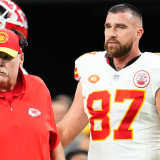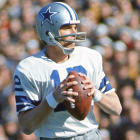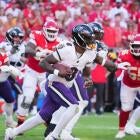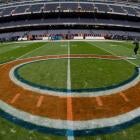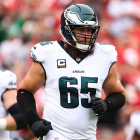'The Last Dance': Four NFL teams that could have won another championship but broke up the dynasty too soon
Some of the greatest teams in NFL history could have won another championship
Michael Jordan and the Chicago Bulls made up one of the greatest dynasties in the history of the NBA and this legendary squad broke apart without ever losing the throne to another team on the court. Jordan and the 1990s Bulls never aged gracefully and died a slow death like many other sports dynasties before them, instead, they walked away on top (after winning again) -- a rarity in professional sports.
At the conclusion of "The Last Dance," Jordan confirmed he did not want to retire after Chicago took its sixth championship in that 1998 season. Jordan admitted he, and many other key contributors on that Bulls team, would have signed one-year deals to come back and compete for that seventh title. As history shows, that never happened. The Bulls broke up and had the worst winning percentage in the NBA over the next five years while the majority of players from that 1997-98 title team moved on to other organizations. Some won championships (Steve Kerr, Ron Harper) while others came close to winning again (Scottie Pippen).
Bottom line -- the Bulls never had the chance to win another championship with Jordan and company. The missed opportunity translates to the NFL. There were teams that had a chance to win more championships than what they currently have at what was perceived to be the end of their runs. These dynasties could have lasted longer if they would have earned another championship.
Which NFL teams deserve a 'Last Dance' type documentary? And who's the NFL's Michael Jordan? Will Brinson and the Pick Six Podcast Superfriends break it all down; listen below and be sure to subscribe for daily NFL goodness.
We're going to take a look back at the best teams that missed a shot at earning another championship, based on the following qualifications:
- The team had their franchise QB still in the mix
- The team already won two championships with core roster intact
- The team had to reach at least the conference championship game after their final championship
- The team missed the opportunity to win another championship after their last one. (This eliminates teams like the New England Patriots, who won after crushing losses to the New York Giants and Philadelphia Eagles because they won another title later on.)
- Teams that qualified for this list are post-NFL merger in 1950 with the All-American Football Conference when the league expanded from 10 to 13 teams.
This list is up for debate, but that's the fun of looking back at teams that had an opportunity to become even greater than they already were. So let's dive right in.
The 1964 Baltimore Colts
How they went out: Lost in NFL Championship to the Cleveland Browns
Why they could have won another: The Colts were the NFL's team of the late 1950s, winning back-to-back NFL championships in 1958 and 1959 under Hall of Fame quarterback Johnny Unitas. They had one of the NFL's original gunslingers was still in his prime (age 31) and Unitas was a First Team All-Pro. Hall of Famers Lenny Moore and Raymond Berry were still playing at a Pro Bowl level while Jimmy Orr led the NFL in yards per catch. John Mackey was in year two of a Hall of Fame career. Gino Marchetti was still playing at an All-Pro level at 37 and Bobby Boyd was an All-Pro with nine interceptions.
What happened in 1964: The Colts led the league's top-ranked offense in points and yards and the defense was just as dominant, ranking first in the NFL in points allowed. Baltimore had the NFL's best record at 12-2 and led the league in point differential at +203.
The Colts were shut out in the NFL Championship Game by the Cleveland Browns, which turned out to be Cleveland's last NFL title. This revamped Colts team missed out on their chance at a third title in seven years as that core blew their last opportunity to win a championship.
Aftermath: The Colts won four division titles over the next seven seasons and Unitas did get another championship in 1970 (winning Super Bowl V), but head coach Don Shula wasn't there while Mackey and Orr were the only contributors left from that 1964 team. Shula was coming into his own as a coach in 1964, his second year at the helm after Weeb Eubank moved on to coach the AFL's New York Jets -- so the Colts were able to continue winning, even with an aging Unitas and new players on the roster.
In the middle of the Packers dynasty, the Colts could have had one of their own if they would have won that third championship in 1964. That title game loss wasn't even the most embarrassing loss of the decade for Baltimore.
1978 Dallas Cowboys (12-4)
How they went out: Lost Super Bowl XIII to the Pittsburgh Steelers
Why they could have won another: The 1970s Dallas Cowboys led by Roger Staubach could have been even greater, having a third Super Bowl title in seven years (and second consecutive championship) just snatched away from them -- on a dropped pass. Jackie Smith's drop in the end zone is arguably one of the biggest missed catches in NFL history, costing Dallas the opportunity to be the team of the 70s.
What happened in 1978: Dallas led the NFL in points scored and was third in points allowed, finishing second in total yards and yards allowed. They were first in the NFL in point differential (+176) and shut out the Los Angeles Rams in the conference championship game (the other NFC team that won 12 games).
With the Cowboys trailing 21-14 late in the third quarter of Super Bowl XIII, Smith found a way to get wide open in the middle of the end zone as Roger Staubach fired a pass to the Hall of Fame tight end. Somehow, Smith dropped the pass -- as Staubach had all day to throw -- and the Cowboys were forced to settle for a field goal and cut the deficit to 21-17 with 2:41 to play in the third. The Cowboys ended up losing to the Steelers 35-31 as Pittsburgh captured its third championship in five years while Dallas fell to Pittsburgh for the second time in four years.
Aftermath: Smith played his final game in the NFL (he spent his first 15 years with the St. Louis Cardinals) and Staubach played in his final Super Bowl as he would retire after the 1979 season. Staubach was still playing at a high level as he led the league in passer rating in the final two seasons before he retired (1978 and 1979). The Cowboys had Tony Dorsett, Randy White and Ed "Too-Tall" Jones heading into their primes with a few good years left from Drew Pearson and Harvey Martin.
The Cowboys would never reach another Super Bowl with that group, losing three consecutive conference championship games from 1980 to 1982. There were plenty of Cowboys teams that easily qualify for this list, but the 1978 team was clearly the best of the bunch.
This was a missed opportunity for the Cowboys, one head coach Tom Landry and the franchise would never recover from.
1997 San Francisco 49ers
How they went out: Lost NFC Championship Game to the Green Bay Packers
Why they could have won another: What could have been for the 49ers if Jerry Rice was healthy? Rice tore his ACL and MCL in the second game of the 1997 season (coming off five consecutive All-Pro seasons and 11 straight Pro Bowls) and the 49ers still won 11 consecutive games and finished tied for the league's best record at 13-3.
What happened in 1997: Thanks to the emergence of Terrell Owens and J.J. Stokes, Steve Young led the league in completion percentage, yards per attempt and passer rating at the age of 36. The 49ers were fifth in points scored and possessed the top-ranked defense in yards allowed and finished third in points allowed. They also were the second-ranked defense in pass and rush yards allowed, having five Pro Bowlers in Dana Stubblefield, Lee Woodall, Ken Norton, Chris Doleman, and Merton Hanks.
San Francisco earned home-field advantage in the conference championship game against Green Bay and laid an egg, failing to score a touchdown until garbage time in a 23-10 blowout loss. This was the third consecutive season the 49ers lost to the Packers in the playoffs, but the 1997 team was arguably their best shot to beat them.
Aftermath: Young's career ended in 1999 after suffering his fourth concussion in three years while Rice moved on after the 2000 season. The 49ers pressed forward with Owens and Jeff Garcia taking over for Young but failed to get past the divisional round.
The 1997 49ers had the opportunity for Young to win his second Super Bowl in four years and the franchise to capture its sixth Super Bowl in 16 years. After Young got the "monkey off his back" in 1994, that was the end of the 49ers dynasty -- which could have lasted a few more seasons.
2010 Pittsburgh Steelers
How they went out: Lost Super Bowl XLV to Green Bay Packers
Why they could have won another: The Steelers weren't the best team in the NFL in 2010, but Ben Roethlisberger still found a way to get Pittsburgh to its third Super Bowl in six years (thanks to the New York Jets upsetting the 14-win Patriots in the AFC divisional playoffs). Regardless, the Steelers reached the Super Bowl and had the No. 1 defense in points allowed and were second-ranked in yards allowed.
Pittsburgh's offense wasn't bad either, despite ranking 12th in points scored and having just one Pro Bowler (Maurkice Pouncey). Roethlisberger had a strong season despite missing four games while Rashard Mendenhall rushed for over 1,200 yards. The Steelers pass catchers were Mike Wallace, Hines Ward, Emmanuel Sanders, Antonio Brown, Antwaan Randle El, and Heath Miller -- hard to find many receiving groups in NFL history that can match that collection of talent. This was a very balanced team overall.
What happened in 2010: Pittsburgh won eight of nine games to advance to Super Bowl XLV, holding its opponents to 10 points or fewer in five of those contests. The Steelers were actually underdogs heading into Super Bowl XLV against the No. 6 seeded Packers, and fell behind 21-3 at the two-minute warning in the first half. Pittsburgh cut the deficit to 21-17 and 28-25, but failed to take the lead against Aaron Rodgers and company late in the game.
Trailing 28-25, Pittsburgh's defense couldn't get off the field on third-and-10 with 5:59 left, allowed a 14-yard run to James Starks and a 21-yard completion to Greg Jennings that allowed the Packers to get points and take five minutes off the clock. Roethlisberger failed to get past his own 35-yard line in the final minute and Pittsburgh hasn't been back to the Super Bowl since.
Aftermath: While the Patriots were figuring out how to win Super Bowls again, the Steelers won two titles in four years and missed a golden opportunity to get that third championship with Roethlisberger. Pittsburgh has only been to the conference championship game once since the Super Bowl loss despite Roethlisberger earning five Pro Bowls in that span.
The Steelers 2000s dynasty could have been even greater.


